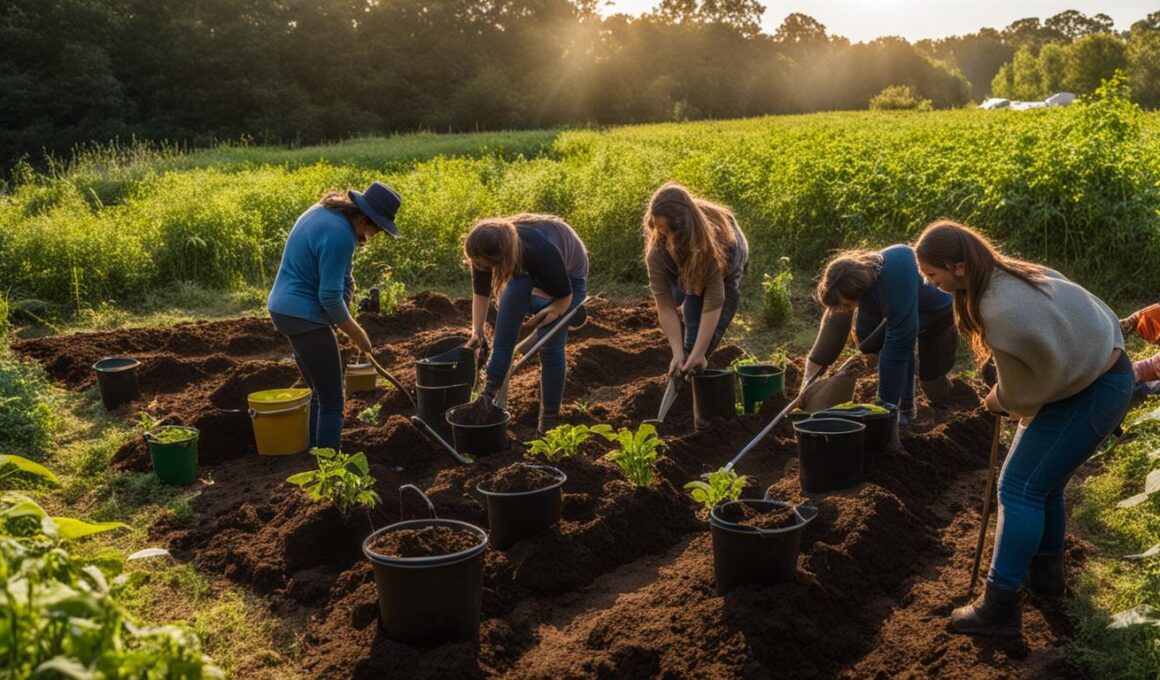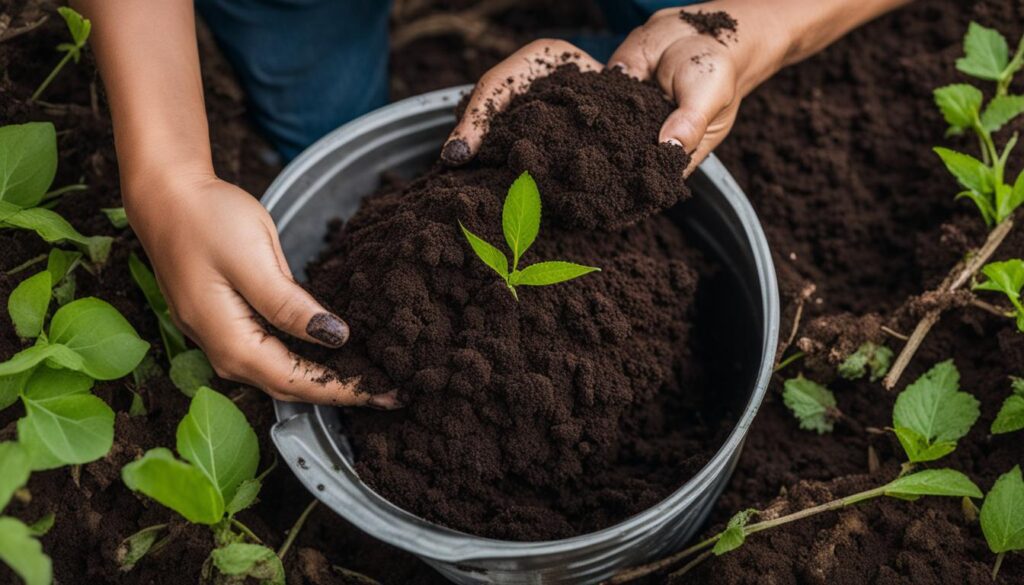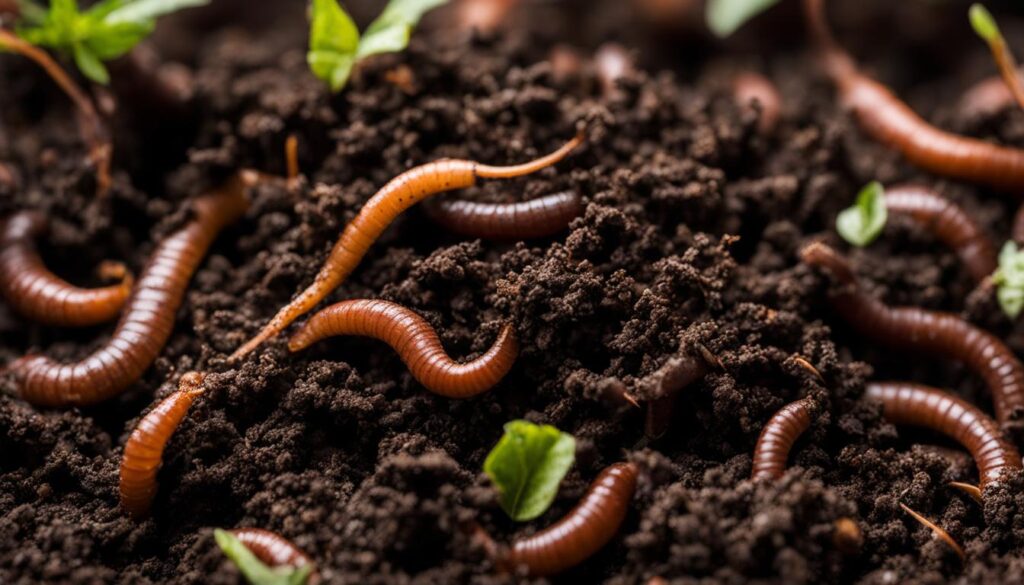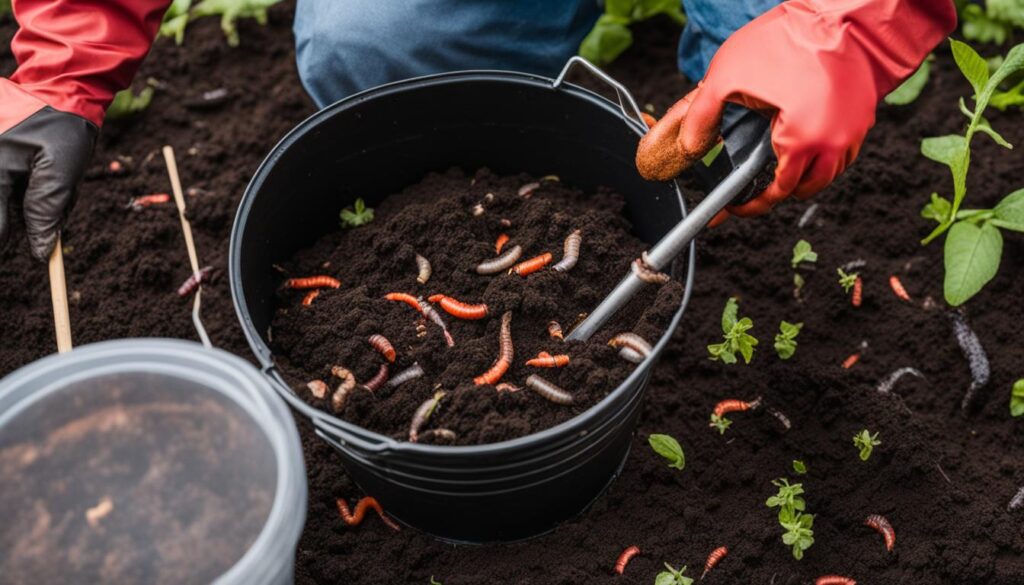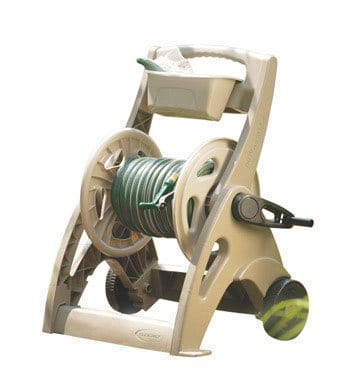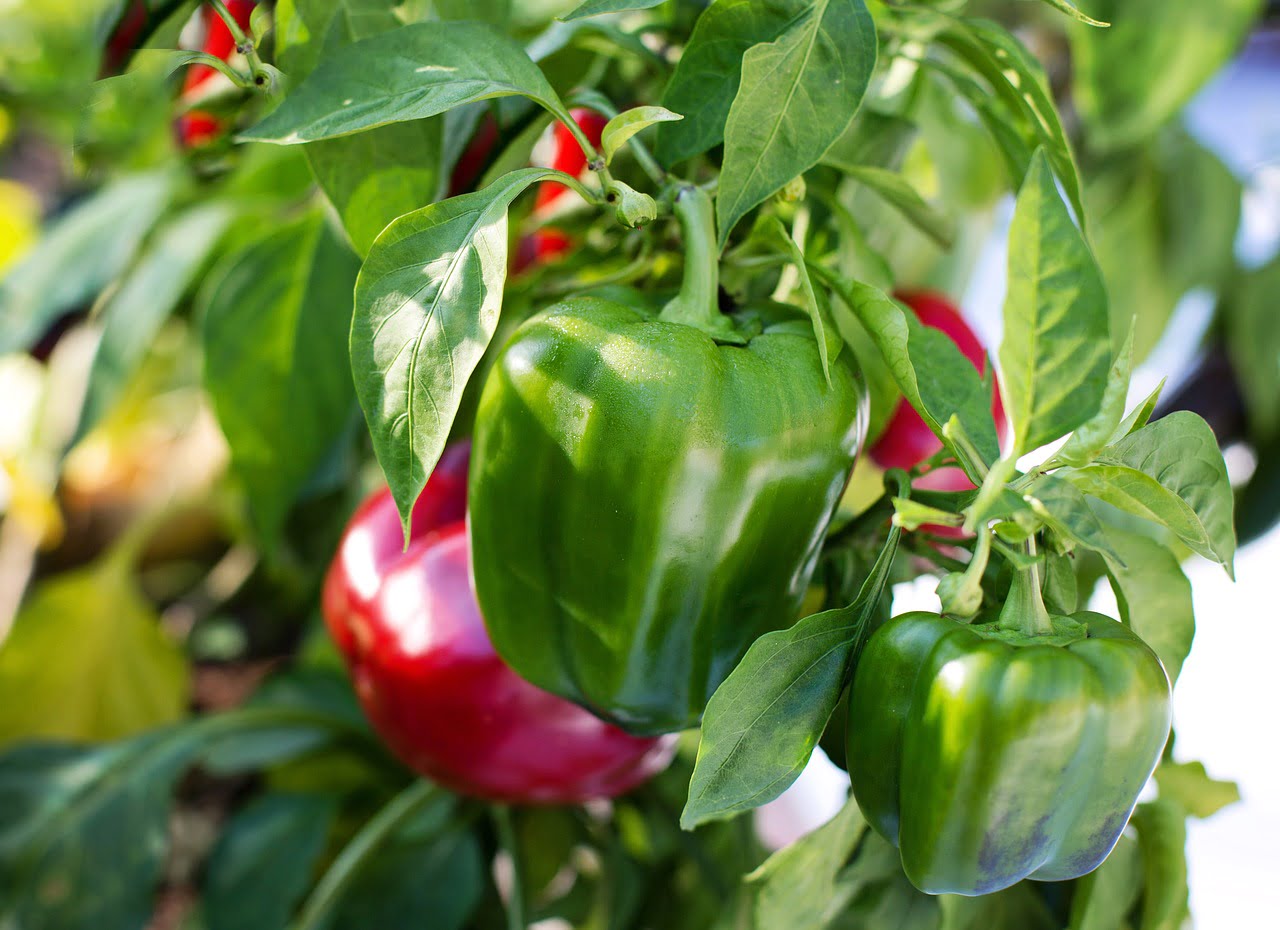Are you interested in finding a natural and sustainable way to create nutrient-rich compost for your garden? Look no further than worm farming, also known as vermiculture. Worm composting takes advantage of the natural process of worm digestion, producing high-quality fertilizer that can greatly improve your soil’s health. To start your own worm farm, all you need is a worm bin and the knowledge of how to maintain it and harvest the rich compost it produces. Join the ranks of gardeners, environmentalists, and hobbyists who have discovered the joy and rewards of worm farming. With the right techniques and understanding, you can unlock the secrets of successful worm harvesting and turn your compost into a valuable resource.
Key Takeaways:
- Worm farming, or vermiculture, is a natural and sustainable method of creating nutrient-rich compost for gardening.
- By cultivating a worm population and harvesting their compost, you can significantly improve the quality and productivity of your soil.
- Worm farming is a sustainable waste reduction method that diverts organic waste from landfills and turns it into valuable resources.
- Getting started with worm farming is relatively simple and cost-effective compared to other composting methods.
- Successful worm harvesting requires specific techniques such as setting up a worm bin, maintaining the right conditions, and providing a balanced diet for the worms.
The Benefits of Worm Harvesting
Worm harvesting offers a multitude of benefits for both gardeners and the environment. By engaging in this sustainable practice, you can create nutrient-rich compost, resulting in improved soil quality and enhanced plant growth. The compost produced by worms is packed with essential nutrients that nourish your plants, promoting their vitality and productivity. It is a natural and cost-effective solution to enhance the health of your garden.
In addition to its impact on gardening, worm harvesting also contributes to waste reduction and sustainability efforts. By diverting organic waste from landfills and utilizing it for worm composting, you are reducing your ecological footprint. This practice aligns with the principles of circular economy, where waste is transformed into a valuable resource. By harnessing the power of worms, you can actively participate in creating a greener and more eco-friendly environment.
Furthermore, worm harvesting is a simple and accessible method for individuals to engage in. It requires minimal space and setup, making it suitable for both urban and suburban dwellers. Whether you have a small backyard or a balcony garden, you can easily start your own worm farm. It is a rewarding hobby that allows you to connect with nature and gain a deeper appreciation for the natural processes that sustain life.
| Benefits of Worm Harvesting | Key Points |
|---|---|
| Soil Improvement | Enhances soil quality and promotes healthier plant growth |
| Waste Reduction | Diverts organic waste from landfills, contributing to sustainability |
| Accessibility | Simple and easy to set up, suitable for various living spaces |
By adopting worm harvesting as part of your gardening routine, you can unlock the potential of these remarkable creatures and witness the transformative power of their compost. It is a sustainable and enriching practice that not only benefits your garden but also supports a healthier and more environmentally-conscious lifestyle.
Getting Started with Worm Farming
Before you embark on your journey of worm farming, it’s important to understand how it works. Worm farming is a process that aims to generate nutrient-dense compost, perfect for home gardens. Unlike traditional composting methods that can be time-consuming and smelly, worm farming offers a more accessible and affordable solution.
To get started, you’ll need to set up a worm bin, providing the worms with a suitable habitat to thrive and reproduce. Once your bin is ready, you can begin adding a variety of organic materials for the worms to consume. This can include kitchen scraps, yard waste, and shredded newspaper. Maintaining the right moisture level and providing adequate aeration are crucial for creating an optimal environment for the worms to thrive.
Over time, the worms will digest the organic matter and produce nutrient-rich compost that can be easily harvested and used in your garden. This process allows you to consistently produce high-quality fertilizer without the hassle of waiting for traditional compost to decompose or the need to purchase expensive fertilizers from external sources. With worm farming, you can harness the natural process of worm digestion to create wealth for your home garden.
Benefits of Getting Started with Worm Farming
Worm farming brings a host of benefits to not only your garden but also the environment. By practicing worm farming, you can significantly improve the quality of your soil, leading to healthier and more productive plants. The nutrient-dense compost produced by worms enhances plant growth and vitality, ensuring your garden thrives.
Furthermore, worm farming is a sustainable method of waste reduction. Instead of sending organic waste to landfills, you can divert it to your worm bin, where it becomes a valuable resource. By participating in worm farming, you contribute to a greener and more eco-friendly lifestyle, reducing your carbon footprint while repurposing waste into something beneficial.
Start your worm farm today and unlock the secrets of successful worm harvesting. Create a thriving ecosystem that not only supports your gardening endeavors but also promotes sustainability and nurtures your plants with nutrient-rich compost.
Worm Harvesting Techniques
Worm harvesting involves specific techniques to ensure successful compost production. The first step is to set up a worm bin, providing the worms with a suitable environment to thrive and reproduce. Once the bin is established, you can begin adding kitchen scraps, yard waste, and other organic materials for the worms to consume. It is important to maintain the right moisture level and aeration in the bin, as this creates an optimal environment for the worms. Over time, the worms will digest the organic matter and produce nutrient-rich compost, which can be harvested and used in your garden. Worm harvesting provides a sustainable and cost-effective solution to obtaining fertilizer for gardening.
Fertilizer Composition
Worm compost, also known as vermicompost, is a nutrient-rich fertilizer that can significantly improve the quality of your soil. It is composed of a balanced blend of organic matter, beneficial microorganisms, and worm castings. Worm castings are the digested waste produced by worms and are highly concentrated in essential nutrients like nitrogen, phosphorus, and potassium. These nutrients are vital for plant growth and development, making worm compost an excellent choice for enriching your garden soil.
Table: Nutrient Content of Worm Compost
| Nutrient | Content (%) |
|---|---|
| Nitrogen | 1.5-2.5 |
| Phosphorus | 0.5-1.0 |
| Potassium | 1.0-1.5 |
| Calcium | 2.0-3.0 |
| Magnesium | 0.2-0.5 |
Harvesting Techniques
When the compost in your worm bin has reached its desired maturity, it’s time to harvest it for use in your garden. There are several methods you can employ to separate the worms from the compost. One popular technique is to create a “worm migration” scenario by piling fresh food scraps on one side of the bin. The worms will naturally migrate to the new food source, allowing you to scoop out the finished compost from the other side. Another method involves using a screen or mesh to filter out the worms while keeping the compost intact. Whichever method you choose, be sure to handle the worms with care and return them to the bin after harvesting to continue their valuable work.
Quote: “Worm composting is a sustainable way to convert organic waste into nutrient-rich fertilizer for your garden. By implementing the right techniques, you can cultivate a thriving worm population and consistently produce high-quality compost for your gardening needs.” – Gardening expert
By mastering the techniques of worm harvesting, you can harness the power of these amazing creatures to create nutrient-rich compost for your garden. The sustainable and cost-effective nature of worm farming makes it an ideal choice for gardeners looking to improve their soil and reduce waste. So why wait? Start your own worm farm today and unlock the secrets of successful worm harvesting!
Tips for Successful Worm Harvesting
Successful worm harvesting requires proper care and attention to ensure optimal compost production. By following these essential tips, you can maximize the efficiency and effectiveness of your worm farm:
- Provide a balanced diet: To keep your worms healthy and active, it’s important to feed them a balanced diet of organic waste. This can include fruit and vegetable scraps, coffee grounds, tea leaves, and shredded newspaper. Avoid overfeeding your worms, as this can lead to odors and imbalances in the bin.
- Maintain the right moisture level: Worms thrive in a moist environment, so it’s crucial to monitor and maintain the moisture level in your worm bin. The ideal moisture content is similar to a wrung-out sponge. If the bin becomes too dry, add water to maintain the moisture balance.
- Aerate the compost: Regularly turning the compost in your worm bin helps to introduce oxygen and prevent anaerobic conditions. This promotes decomposition and prevents foul odors. Gently mix the compost every few weeks using a garden fork or similar tool.
- Control the temperature: Worms prefer temperatures between 55°F and 77°F (13°C and 25°C). Avoid exposing your worm bin to extreme heat or cold. If necessary, insulate the bin during colder months or move it to a shaded area during hot summer days.
- Harvest the compost properly: When the majority of the bedding and organic waste has been consumed by the worms and converted into rich compost, it’s time to harvest. There are several methods you can use to separate the worms from the compost, such as the migration method or using a worm harvester. Whatever method you choose, be gentle to avoid harming the worms.
By following these tips and giving your worms the proper care and attention, you will be able to maintain a healthy worm population and consistently produce high-quality compost for your garden. Remember, worm harvesting is a continuous process, so be patient and enjoy the rewards of your efforts.
Expert Tip: The Balance is Key
“Creating a balanced environment for your worms is essential for successful worm harvesting. Just like humans, worms need a healthy and diverse diet, proper moisture levels, and adequate ventilation to thrive. By maintaining these conditions, you can create a harmonious ecosystem that will yield nutrient-rich compost for your gardening needs.” – Dr. Emma Green, Horticulture Expert
Can Collecting Worm Castings Also Help with Successful Worm Harvesting?
Collecting worm castings is an essential step in successful worm harvesting. Knowing how to collect worm castings can greatly impact the overall success of the process. By properly gathering the castings, you can ensure a healthy and thriving worm population, leading to a more productive harvest.
Conclusion
Worm harvesting is a sustainable and rewarding practice that can greatly benefit your garden and the environment. By harnessing the natural process of worm digestion, you can produce nutrient-rich compost that will improve the quality of your soil and promote healthy plant growth.
Not only does worm farming provide you with a steady supply of compost for your gardening needs, but it also contributes to waste reduction and sustainability. By diverting organic waste from landfills and turning it into valuable resources, you are playing a vital role in creating a greener and more eco-friendly world.
Embracing worm harvesting is a simple and effective way to support your gardening endeavors. The nutrient-rich compost produced by worms will nourish your plants, ensuring they thrive and flourish. Start your own worm farm today and unlock the secrets of successful worm harvesting to enhance your gardening experience and contribute to a more sustainable future.
FAQ
What is worm farming?
Worm farming, also known as vermiculture, is a natural and sustainable way to create nutrient-rich compost for gardening.
How does worm harvesting benefit gardeners?
Worm harvesting improves soil quality, enhances plant growth, and increases garden productivity.
Is worm farming an eco-friendly waste reduction method?
Yes, worm farming allows you to divert organic waste from landfills and turn it into valuable resources.
What do I need to start my own worm farm?
You will need a worm bin and the knowledge of setting it up, maintaining it, and harvesting the compost.
How does worm digestion produce nutrient-rich compost?
Worms consume organic waste and produce compost through their digestion process, which is then used as fertilizer for gardens.
What should I feed my worms?
Provide a balanced diet of organic waste, including fruit and vegetable scraps, coffee grounds, and shredded newspaper.
How can I create an optimal environment for worm composting?
Maintain the proper moisture level, regularly turn the compost, and control the temperature to help the worms thrive and reproduce.
How can I optimize my worm harvesting process?
Avoid overfeeding the worms, maintain the right moisture level, turn the compost regularly, and provide proper temperature control.
What are the benefits of worm harvesting for gardeners and the environment?
Worm harvesting improves soil quality, enhances plant growth, reduces waste sent to landfills, and promotes a more sustainable lifestyle.
How can I get started with worm harvesting?
Set up a worm bin, add organic waste for the worms to consume, and follow proper techniques for maintaining the bin and harvesting the compost.





